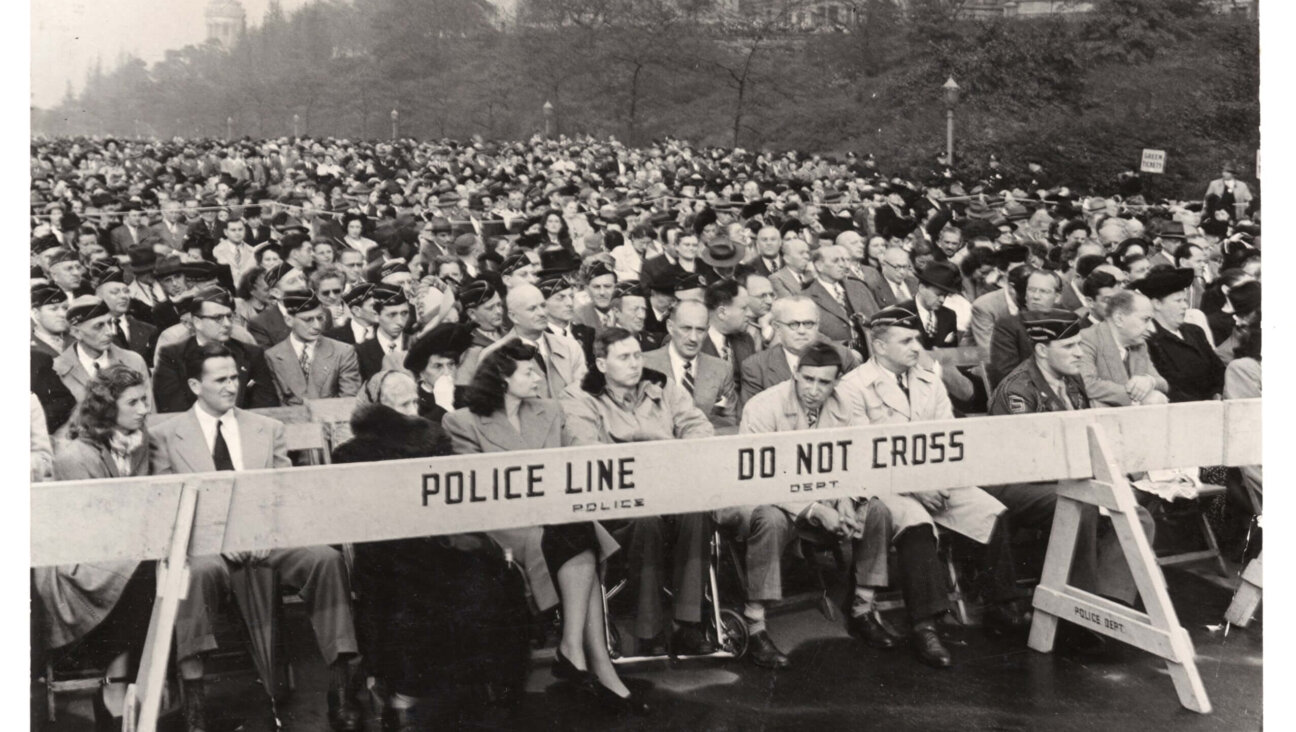The Last Word
Joseph Friedenson is anxious. A deadline is approaching, and he’s got to put the next edition of Dos Yiddishe Vort to bed. Never mind that he hasn’t missed a deadline — in 54 years. He’s still worried.
Then again, he doesn’t have much help. Friedenson, whom I know as Uncle Yossel, has been editing this Yiddish monthly almost single-handedly since 1953 — since 1945 if you count the first editions he put out in the Feldafing and Landesberg displaced persons camps in Germany. He oversees every last detail of every edition, and I watch as he lays out the paper with his own hands on his large dining room table in his home on the Upper West Side of Manhattan.
Dos Yiddishe Vort, which is published by Agudath Israel of America, is a 64-page black-and-white, no-frills journal “dedicated to the problems of Torah Judaism.” It is the mouthpiece for the dwindling Yiddish-speaking contingent of the Agudah, that generation of Holocaust survivors who were determined to regenerate ultra-Orthodoxy in the wake of the near-destruction of European Jewry.
By the late summer of 1945, the DP camps were home to thousands of war victims. As secular and Zionist organizations began to flourish, Friedenson and a number of other young Agudah stalwarts believed that Orthodox Jews needed to organize to ensure kosher food, mikvehs and religious schooling for the survivors who had trickled into the camps with young children. The Agudah was resurrected, and the earliest editions of Dos Yiddishe Vort issued their clarion call to the returning refugees to demand basic necessities for maintaining a proper Jewish life. The first two issues were written in Latin letters, because Yiddish type was not yet available.
Six years later, as a newly arrived immigrant to the United States, Friedenson was assigned by the financially strapped Agudah to be its liaison to a New York Yiddish press that was largely secular and fervently Zionist. His mission: to plant stories about the Agudah party in Israel and its bitter struggle with Ben-Gurion’s socialist government, which the party claimed was trying to forcibly secularize the new wave of Sephardic immigrants.
In America, of course, another fight was brewing. The halachically observant Conservative movement was making considerable headway in an increasingly assimilated American Jewish community. For the Eastern European vanguard of the Agudah, the party represented a huge threat to authentic Torah Judaism, and Orthodox Jews needed to be educated about the danger they posed. After two fruitless years of chasing the New York Yiddish press, Friedenson was finally given a shoestring budget and his own monthly publication. He’s been at its helm ever since.
The job has been a perfect fit for Friedenson, who remains an avid newspaperman. He faithfully reads The New York Times, The New York Sun, the Israeli papers Yediot Aharonot and Ha’aretz, which are written in Hebrew, and the Haredi tabloid Hamodia. He also often reads the German editions of Der Spiegel, Frankfurter Algemeine and Die Zeit — a prewar habit he still indulges. In fact, he tells me, mischievously, that prominent Yiddishists Shikl Fishman and the late Mordkhe Schaechter accused his Yiddish of being too Germanized. “What do you say to that?” I asked him. “They’re right!” he exclaimed, without a trace of defensiveness. “Their Yiddish is better.”
Maybe, though Schaechter himself might have disagreed. At the wedding of one of his daughters, Schaechter brought Friedenson over to renowned Yiddish writer and editor Itche Goldberg and said, “I want to introduce you to the editor of the finest Yiddish journal.” Goldberg promptly turned to him and asked, “Are you Friedenson?”
Friedenson once commanded an impressive writing staff that included the Yiddish literati of their day, such as Moshe Prager, David Adler, Moshe Yehuda Gleicher, Nissim Gordon, Rabbi Simcha Elberg, Hillel Seidman and a number of writers in Israel who would dispatch their articles by post.
These days, he sheepishly admits, he writes nearly all the articles in each edition, albeit under seven to eight thinly veiled pseudonyms: the biographical “A. Lodzer,” the prosaic “A. Schreiber,” the genealogical “Achi Shimshon Raphael” (a reference to his brother, who perished in the Holocaust) and, the most common, “Gershon Leizerson,” a proud nod to his father, Eliezer Gershon Friedenson, an Agudah leader in prewar Europe and, like his son, editor of its paper.
It was the elder Friedenson who early on championed the Bais Yaakov movement, which sought to provide a Torah education to women and also convinced the Agudah to throw its weight behind it. More importantly, his father began publishing the widely circulated, highly respected Bais Yaakov Journal, which gave the cause the impetus it needed to succeed. As Friedenson describes him, “the man was bristling with energy and ideas.”
In its heyday during the 1970s and ’80s, Dos Yiddishe Vort boasted an international readership of 7,000-8,000. It encouraged the establishment of yeshivas and kollels, and celebrated the growth of ultra-Orthodoxy in America. But even as the Agudah grew stronger over the years, the journal’s readership began to decline. Today, it has been supplanted as the main press organ of the Agudah by the English-language Jewish Observer, which is more reflective of the movement’s younger, American, politically savvier membership.
Nowadays, Dos Yiddishe Vort more often commemorates the rabbis and communities of Eastern Europe that perished during the Holocaust, issuing fat, special editions devoted to the Jews of Lodz or Lublin, to the Gerer rebbe or the Chazon Ish; recounting tales of exceptional spiritual heroism under duress, and chronicling events at the annual Agudah conventions and other convocations.
Friedenson’s writing has also turned more personal. He has begun writing about his own war experiences, and the way they have strengthened his own faith. I can recall hearing those stories as a child, when I would go to “Tante Gitele” for the Sabbath. She was my late mother’s first cousin, and in our home, Yossel was famous only for being Gitele’s husband. They were married in November 1941 in the Warsaw Ghetto, and, together with my mother, survived the destruction of the Szydlowiec Ghetto, the Starachowice labor camp and Auschwitz before Yossel was finally liberated from Buchenwald; Gitele and Yossel were reunited a few months after the war ended.
Gitele died a year ago, after 64 years of marriage. In many ways, Yossel’s story is not complete without her. Their home was an embodiment of the rabbinic world depicted in Dos Yiddishe Vort. The wood floors were always shined to a high gleam, the lace curtains bleached white, the silver polished, the table opened to its fullest length; bookcases overflowed, and you could smell a sponge cake or roast chicken in the oven whenever you walked in. Prominent rabbis came and went at all times, and the atmosphere was a blend of Old World propriety and relaxed hospitality.
In her hilarious but no-nonsense way, Gitele would scold Yossel sharply and at high-pitched volume to stop smoking, sit up straight, not put so much sugar in his tea, and to make sure not to throw out his lunch and take the garbage to work, as he often did in his distraction. He pretended to be henpecked, but he absolutely adored her and confesses that, in his eyes “she never aged.” Last year, as she lay dying in the hospital, his grief seemed unbearable. He had only the distraction of der zhournal.
Though Friedenson is widely respected in the ultra-Orthodox world, Dos Yiddishe Vort’s readership today is just a fraction of what it once was. Although there is still an active Yiddish readership in many of the Hasidic communities, Yossel claims that for some of them, his Yiddish is too sophisticated, too modern.
Uncle Yossel and I conclude our interview with a hot bowl of chicken soup, fresh from the freezer, prepared by one of his daughters. “You can’t get a better meal anywhere in Manhattan,” he insists “not even for $50.” Tomorrow he is leaving for Miami Beach. But he doesn’t plan to do much walking along the boardwalk. After all, he’s got a deadline to meet.
Toby Appleton is a freelance filmmaker and writer in New York and Jerusalem.

I hope you appreciated this article. Before you go, I’d like to ask you to please support the Forward’s award-winning journalism this Passover.
In this age of misinformation, our work is needed like never before. We report on the news that matters most to American Jews, driven by truth, not ideology.
At a time when newsrooms are closing or cutting back, the Forward has removed its paywall. That means for the first time in our 126-year history, Forward journalism is free to everyone, everywhere. With an ongoing war, rising antisemitism, and a flood of disinformation that may affect the upcoming election, we believe that free and open access to Jewish journalism is imperative.
Readers like you make it all possible. Right now, we’re in the middle of our Passover Pledge Drive and we need 500 people to step up and make a gift to sustain our trustworthy, independent journalism.
Make a gift of any size and become a Forward member today. You’ll support our mission to tell the American Jewish story fully and fairly.
— Rachel Fishman Feddersen, Publisher and CEO
Join our mission to tell the Jewish story fully and fairly.
Our Goal: 500 gifts during our Passover Pledge Drive!
























